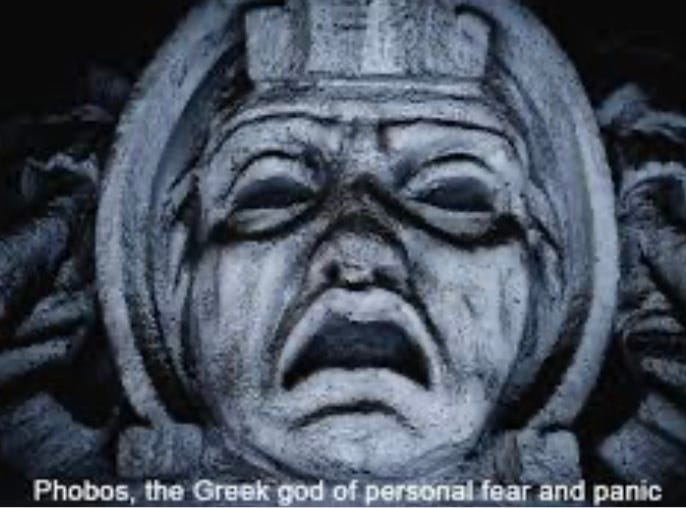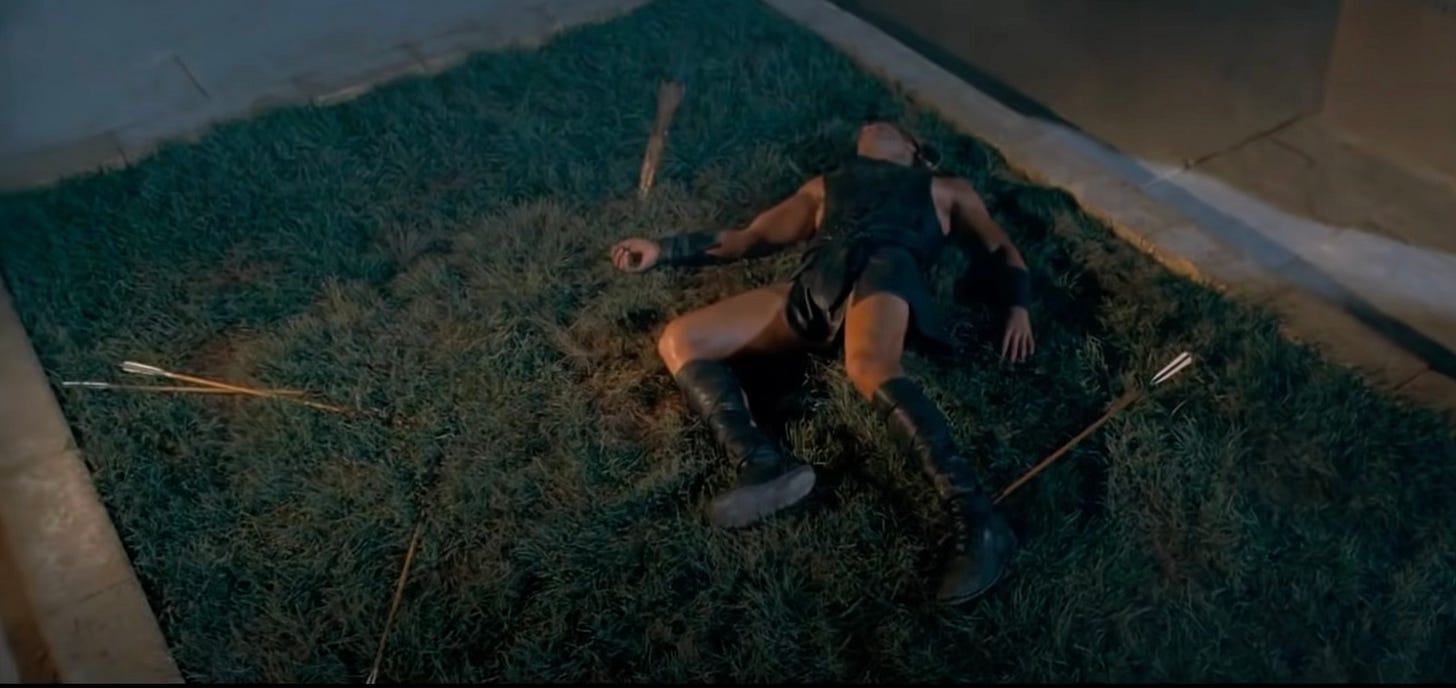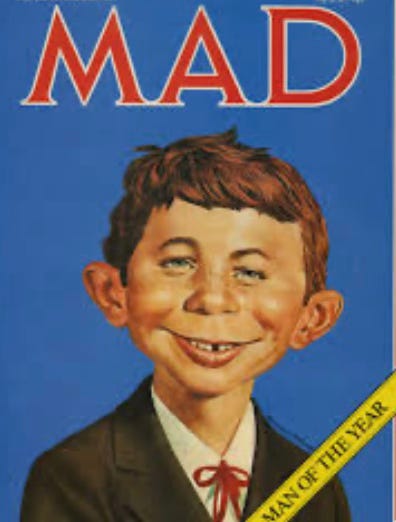In eighth grade, I overheard a girl say to her friend about me, “How can anyone possibly be uglier?” The memory still stings fifty years later. And for nearly a decade after that comment, I believed I was ugly.
My title of Bad Is Stronger Than Good is taken from a paper that does a comprehensive job of proving what we know instinctively––that we are affected more by loss than by gain (hence, loss aversion) and that nowhere is this more evident or more poignant and harmful than in our emotional reactions to various comments and events. 1
The authors of that paper cite the extensive research of the marriage expert John Gottman who found that a healthy marriage needs five positive interactions/comments to offset each negative interaction/comment.
As the authors write in their summary
“The self is more motivated to avoid bad self-definitions than to pursue good ones.”
That’s loss aversion applied to self-esteem, and there is an evolutionary, survival-of-the-fittest explanation.
“Survival [in natural selection] requires urgent attention to possible bad outcomes…” 2
This may go back many millions of years to organisms that long predated our species. We are heirs to an unimaginably long line of anxious creatures who survived by anticipating disasters that might or might not happen.
We are therefore expert at catastrophizing. When my firm was defrauded of a relatively insignificant sum, I was convinced my career would be over. I wrote about that in How A Fraud Broke My Trust In Myself. I wrote
…if the trade is a fake, then I, who am supposedly so careful and vigilant about investing, will be forever marked as a fool.
A coward may die a thousand deaths but they will likely live longer, even if more anxiously, than the valiant hero.
Below, Brad Pitt as Achilles dying. Note the arrow through his heel.
A Bad Mood Rising
It’s debated rather fiercely whether the average American (whoever you are, reveal yourself!) is better off financially today than they were, say, a decade ago. But while economic well-being and status are related, they are not identical.
The key difference is that status is always a relative measure while economic well-being can be both an absolute and a relative measure. For example, a decade passes and your income in real terms has gone up by 10% but everyone else’s income in your community has gone up by 30%. You will likely feel a decline in economic well-being and certainly will feel a loss in status. You will feel anxious that you are being left behind because you are worse off in relative terms even if you’re better off statistically.
There’s no definitive way to measure status anxiety. Instead, we have CDC household surveys and Pew polls and an explosion of articles and books that address various aspects of increased status anxiety. I’m going to self-stipulate that when more people say they feel anxious and more people are discussing status anxiety, then the rise in the feelings of status anxiety is real.
One obvious reason for the rise in anxiety is that actual inequality of wealth and privilege is close to the all-time highs of the late 19th century Gilded Age. The other obvious culprit is social media. The more unequal a society and the more that inequality is in our faces the more anxious people will be. The reality of inequality is reflected by the social media perception which feeds into real life aspirations and behaviors and so on in a recursive doom loop. It’s like those facing double mirrors in a Parisian lobby that reflect endlessly back and forth.
Wealth is one factor of privilege, appearance another. ChatGPT will look at a photograph and analyze your appearance. How old you look and what vibes you give off. How to make yourself look better. Of course the feedback is entirely based on what has already been posted to the internet.3
With regard to parenting, in a recent post,
, who has highlighted the enlightened family policies and culture of Denmark, is now seeing parents in Denmark succumb to:“…the all-pervasive, social media curse of ‘intensive parenting’ culture. This is the idea that parents should not only love and support their children, but also pour endless time and resources into crafting ‘the perfect childhood’.” 4
This phenomenon of behavior that’s spurred by what we see others do has a fancy name––Mimetic Desire. We delude ourselves into thinking that our desires are our own when instead they are created by imitating what others desire. This has been discussed in many places, including on my recent Substack Live with
: our conversation and Natasha’s work highly recommended. 5Status Anxiety at all levels
It’s my experience that no matter where you believe you are positioned in the status pecking order, you can be afflicted by status anxiety. The top 10% look to the top 1% who look to the top 0.1%. And even when the wealthy have no rational reason to worry, we still do. There’s no guarantee that we won’t lose what we have. Or see our children or grandchildren slip from one status perch to a lower one. In America, we have no ancestral titles to assure status.
Artificial and other forms of intelligence
Technologically and politically, change is rapidly underway. Part of our inbred loss aversion is to hate change and uncertainty because we are quicker and more likely to imagine the worst rather than the best. With Artificial Intelligence, we think of doomsday scenarios like we’ll all be turned into paperclips. Or we imagine AI will replace many professions. High-status ones like lawyers or investment bankers and mid-status ones like marketing and supply chain managers. We don’t naturally dwell on the upsides of higher productivity or new professions.
Politically, to say that change is underway is an understatement. For many, the change is welcome. For others, me included, the change is terrifying, triggering my fight or flight instinct. And what if there is a severe reaction to the severe politics of 2025 as has often happened in history. Swinging from one political pole to the other is possible.
AI and politics serve to exacerbate uncertainty and therefore anxiety. When confronted by change, we first think how might this change harm me. Because we are genetically coded to prize our own survival and that of our progeny.
All is not grim
It sounds grim––heightened actual inequality magnified tremendously by social media perceptions, exacerbated by extraordinary technological and political uncertainty, all of it feeding into our evolutionary-based propensity to fear the worst.
The best weapon at our disposal is to recognize and perhaps try to poke fun at our own irrational tendencies. To admit that our desires are often, if not mainly, based on what we see others desire. To know that our anxiety and loss aversion come from a necessary inheritance from our ancestors stretching far back. It’s due to their anxiety that we’re able to be here today to drive ourselves to distraction.
To Alfred E. Neuman’s question of “What, me worry?” I answer “Yes, it’s safer than the alternative.” 6
Question for the comments: What are you most anxious about right now?
The paper Bad Is Stronger Than Good by Roy F. Baumeister, Ellen Bratslavsky, Catrin Finkenauer, and Kathleen D. Vohs. I found this paper because it was cited in Daniel Kahneman’s Thinking Fast And Slow, a must read if you’re interested in how our brains work.
“Bad Is Stronger Than Good”
See this article, “Am I Hot Or Not,” about AI and appearance advice. Yes, I asked ChatGPT to guess my age. No I will not reveal the answer.
Live with David Roberts and Natasha Joukovsky
a. natasha joukovsky and I had a great deal of fun talking about the concepts in her post People Would Rather Have Prestige Than Babies.
Alfred E. Neuman, the mascot of Mad Magazine, a widely read and widely loved satirical magazine that I read with glee as a teenager in the 1970s.







I'll answer my own question. I''m anxious thatI'm not doing everything I'm supposed to be doing for my family.
Wow, I am so glad I'm not rich or even middle class right now. I'd like to be solidly middle class again, but having spent lots of years barely getting by, I just don't worry about stuff like this. I talk to my friends from Yale who have high powered jobs and make tons of money, and they are almost all miserable. Exhausted, pressured, can't speak out in support of Israel for fear of professional consequences... while I write happily in my little one bedroom apartment, can substitute teach if I have to because I can actually handle the urban poor,. i'm about to drive my 2004 Subaru to meet my 80 year old mother for lunch at the Olive Garden. My car's air conditioner doesn't work anymore but I don't care! The car goes and is safe. I'd love to be middle class again, as I was for the first twenty or so years of my career, but I'd want to keep all that I've learned from being poor. Dollar store moisturizer and shower gel are fine, anything else is a waste of money. Buy generics. Think about what you need and deal with the wants later. Love is more important than money. I know so many rich people in dead marriages who can't leave because they fear an expensive divorce or they are economically dependent on their spouse. Men more than women actually. At least I know that if a man is spending time with me, it's because he wants to, not because he needs my money! Health, family, spending time in prayer and meditation, spending time with my cat... so much better than all this. I hope you've reached a point where you're not worried about status anymore. You're a great writer with a wonderful family, and a good example to others. What could be better than that?